 Petzlover
Petzlover Cabecudo Boiadeiro is originated from Brazil but Dogo Sardesco is originated from Italy. Cabecudo Boiadeiro may grow 7 cm / 3 inches higher than Dogo Sardesco. Cabecudo Boiadeiro may weigh 37 kg / 82 pounds more than Dogo Sardesco. Both Cabecudo Boiadeiro and Dogo Sardesco has same life span. Both Cabecudo Boiadeiro and Dogo Sardesco has almost same litter size. Both Cabecudo Boiadeiro and Dogo Sardesco requires Low Maintenance.
Cabecudo Boiadeiro is originated from Brazil but Dogo Sardesco is originated from Italy. Cabecudo Boiadeiro may grow 7 cm / 3 inches higher than Dogo Sardesco. Cabecudo Boiadeiro may weigh 37 kg / 82 pounds more than Dogo Sardesco. Both Cabecudo Boiadeiro and Dogo Sardesco has same life span. Both Cabecudo Boiadeiro and Dogo Sardesco has almost same litter size. Both Cabecudo Boiadeiro and Dogo Sardesco requires Low Maintenance.
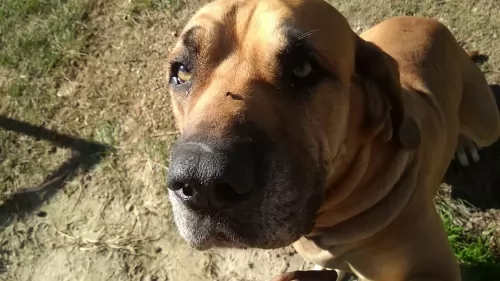 The Cabecudo Boiadeiro has always played an important role in the management of livestock. Stockdogs like this were known in parts of Minas Gerais as early as the 18th century. In fact reports tell us that the Cabecudo has existed since the 16th century as a working dog in the rural parts of Brazil.
The Cabecudo Boiadeiro has always played an important role in the management of livestock. Stockdogs like this were known in parts of Minas Gerais as early as the 18th century. In fact reports tell us that the Cabecudo has existed since the 16th century as a working dog in the rural parts of Brazil.
The Capecudo has remained much the same over the centuries – a dog created as a guardian for large properties, as a game hunter and livestock herder and protector. Today this Molosser dog still drives cattle in Brazil.
 This is an ancient working dog breed which hails from the Italian island of Sardinia. When you do research, you find that no one is sure as to this dogs exact origin, and there are a number of theories as to how the dog developed.
This is an ancient working dog breed which hails from the Italian island of Sardinia. When you do research, you find that no one is sure as to this dogs exact origin, and there are a number of theories as to how the dog developed.
Regardless of how the Dogo Sardesco came about, it is a valued companion of farmers in Sardinia, being appreciated for its protective nature.
The dog is a kind of Molosser or Mastiff dog. In the past the dog has been used as a working and hunting dog, and today he is a popular dog in mainland Italy. He is also known as Sardinian Mastiff, Sardinian Molosser and Dogo Sardo.
The Dogo Sardesco isn’t recognized today by international kennel clubs, and breeders on the island of Sardinia have done nothing to form a breed club for the dog.
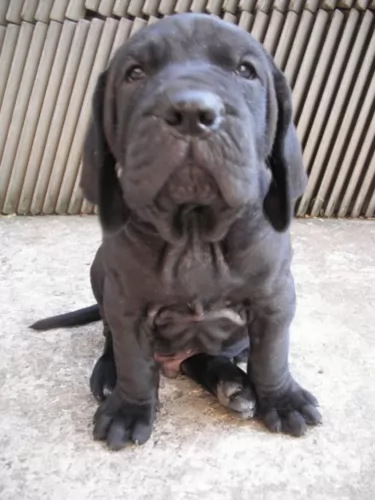 The Brazilian Cabedudo is a strong boned, large dog with a large head and a deep chest. The coat of the dog is short and dense and in wheat-colored shades or fawn shades, while brindle is also in existence. The Cabeçudo Boiadeiro is also known as the Brazilian Mastiff and is a large, imposing dog.
The Brazilian Cabedudo is a strong boned, large dog with a large head and a deep chest. The coat of the dog is short and dense and in wheat-colored shades or fawn shades, while brindle is also in existence. The Cabeçudo Boiadeiro is also known as the Brazilian Mastiff and is a large, imposing dog.
Because the breed was created from a blend of the English Mastiff, the Bulldog and the Bloodhound, not only is this a large dog in height, but a big boned dog as well. He has short to medium length floppy ears and a long tail.
The Brazilian Cabedudo is a courageous dog. When he has been properly trained and socialized, this large dog is capable of becoming an obedient, loving and devoted family pet who is able to get along with children and other pets too. He reserves this gentler side of him for his human family and won’t easily tolerate strangers.
 The dog Sardesco is a medium to large sized dog generally measuring 56 to 68 cm at the withers and weighing roughly 30 to 45 kg.
The dog Sardesco is a medium to large sized dog generally measuring 56 to 68 cm at the withers and weighing roughly 30 to 45 kg.
Because the dog isn’t bred to specific standards, it varies in appearance, but it is a powerful looking dog, being lean and athletic. The dog’s tail is traditionally docked, but with tail docking being frowned upon, the tail is left long and the dog loses its distinctive look.
The head of the dog is large and the ears are also traditionally cropped to be very short. Left naturally, the ears fold down closely to the sides of the head.The eyes are small and amber colored. The coat is short and smooth, but thick, and while it comes in many colors, the more regular color is red, brown, black, grey or brindle.
The Dogo Sardesco becomes a loyal family pet, more so when he has been trained and socialized. Although he is a devoted and affectionate dog, forming particularly strong bonds with his human family, he isn’t recommended for homes where there are young children.
He also doesn’t take too kindly to other pets in the home. This is because they are a strong-willed, dominant breed and might therefore not be a good choice for first-time dog owners.
Because Sardinian breeders have focused on developing an aggressive dog, he has become a dog suspicious of- and aloof with strangers. He is stubborn and self-willed, and to make him more obedient and amicable, he will require training and socialization. He is an alert, intelligent dog and this makes him an excellent watch dog.
The Sardinian Mastiff is an active dog too and won’t do well in a home where the people aren’t interested in exercise. He is the kind of dog that will need to be taken with you on walks, and he will love to spend time running alongside you when you go running or cycling.
He won’t adapt too well to life in the city, particularly when there is just a tiny garden.
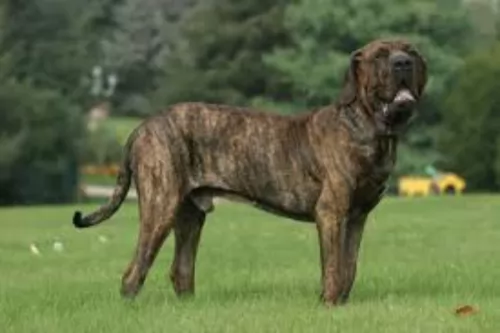 Deciding to become an owner of a dog is a big responsibility, as you are going to have your pet with you for 10 – 15 years at least. There are so many essentials to remember with owning a dog and most dogs are far happier and healthier when allowed to live part of the time indoors with their human family.
Deciding to become an owner of a dog is a big responsibility, as you are going to have your pet with you for 10 – 15 years at least. There are so many essentials to remember with owning a dog and most dogs are far happier and healthier when allowed to live part of the time indoors with their human family.
It's not always easy being a large dog such as the Cabecudo Boiadeiro, as people often assume these mastiff-type dogs are unfriendly and aggressive.
Every dog breed however, is essentially the product of his owners lifestyle and his unique upbringing with them. When this large pet is properly trained and socialized and he is loved and well cared for, he promises to be faithful, devoted, playful and loving – a real friend and protector.
 The Dogo Sardesco has always performed his role as a working dog well, and this is a reliable watch dog as well as the dog takes his job of guarding his human family seriously.
The Dogo Sardesco has always performed his role as a working dog well, and this is a reliable watch dog as well as the dog takes his job of guarding his human family seriously.
With his aggressive temperament, he has appeared on the list of banned breeds, and this is why he isn’t an ideal choice for homes where there are small children, as some small children haven’t been taught how to treat a dog with respect.
However, when properly trained and socialized he becomes an excellent companion dog. He has an intimidating look about him, but when he is with his human family, another side comes out and he is affectionate, loving and protective.
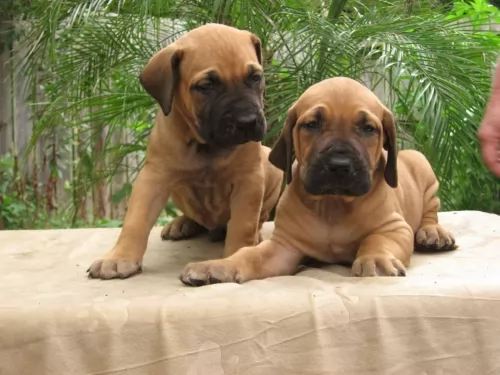 The Cabecudo Boiadeiro is considered a robust breed, used to lots of exercise while herding livestock. With good care and plenty of exercise he can live to 10, 11 or 12 years of age. He is a large breed and this fact alone will ensure that you be aware of some dog illnesses prone to larger breeds.
The Cabecudo Boiadeiro is considered a robust breed, used to lots of exercise while herding livestock. With good care and plenty of exercise he can live to 10, 11 or 12 years of age. He is a large breed and this fact alone will ensure that you be aware of some dog illnesses prone to larger breeds.
This is an orthopedic condition where the hip joints don’t fit properly into the hip joint. Larger breeds such as the Cabecudo Boiadeiro are at a higher risk of getting this orthopaedic disorder.
You’ll see your dog battling to move around and he may not even be able to get up again after lying down. Sometimes a dog might even require surgery. Thankfully, there is testing for hip dysplasia in dogs, and you can ask to see a clearance certificate if you buy your puppy from a so-called reputable breeder.
Progressive retinal atrophy (PRA) is a degenerative eye disorder that can actually lead to blindness in your pet. Night blindness sets in and your dog becomes unsure how to walk in unfamiliar areas, You'll notice that his eyes become gray or cloudy-looking as though there is a film over the eyes. Parent dogs with this eye disease should be spayed or neutered.
 The Dogo Sardesco is a relatively healthy breed who is unlikely to suffer with ailments common to dogs, but nonetheless there are some diseases or conditions that you might want to be aware of with your dog.
The Dogo Sardesco is a relatively healthy breed who is unlikely to suffer with ailments common to dogs, but nonetheless there are some diseases or conditions that you might want to be aware of with your dog.
Skeletal and visual problems can occur in this breed. Both hip- and elbow dysplasia are common orthopedic disorders in dogs and they can cause a lot of pain and discomfort and even cause lifelong disability.
Genes and environmental factors play a part in your dog developing this disease.If he has been diagnosed as having hip or elbow dysplasia, get your dog to the vet as there are treatments which can at least make your pet a lot more comfortable.
Remember that feeding your puppy Dogo Sardesco too much food which is particularly high in calories can mean him growing too fast, and this can contribute to this hip dysplasia problem.
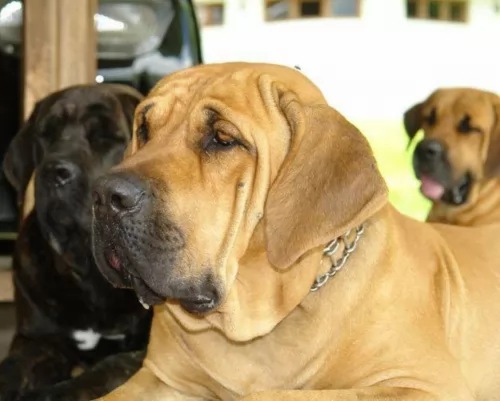 The Cabecudo Boiadeiro is a large breed dog. In spite of his size though, he is surprisingly an active dog. He will need regular exercise such as a brisk walk very day. You can also put aside time to give him some exciting ball games. He is a breed used to working so he will be most unhappy lying around doing nothing.
The Cabecudo Boiadeiro is a large breed dog. In spite of his size though, he is surprisingly an active dog. He will need regular exercise such as a brisk walk very day. You can also put aside time to give him some exciting ball games. He is a breed used to working so he will be most unhappy lying around doing nothing.
If you are going to be feeding your Cabecudo Boiadeiro commercially manufactured good, make sure it is the best quality food. Always go for dog foods which have all the nutrients your large dog requires.
You get wet, dry and raw complete foods and you can give your pet a mix of these. Always make sure that your pet gets some raw meat in from time to time too, otherwise he could battle with skin diseases.
If you aren’t sure how to feed such a large dog, your veterinarian will help you decide which category of food would suit your pet. Clean, cool water is to be provided constantly.
 Dog owners who don’t like the idea of spending too much money on grooming will appreciate that the Dogo Sardesco is a very low maintenance breed, and that a good brushing twice a week will keep the dog’s coat shiny and healthy.
Dog owners who don’t like the idea of spending too much money on grooming will appreciate that the Dogo Sardesco is a very low maintenance breed, and that a good brushing twice a week will keep the dog’s coat shiny and healthy.
As with all other dogs, he will need to have his teeth brushed to remove plaque build up. Not only does plaque lead to dental disease, but bad teeth can lead to other health issues too.
Nail clipping will also be necessary if your pet doesn’t wear the nails down naturally from getting to run on a hard surface from time to time.